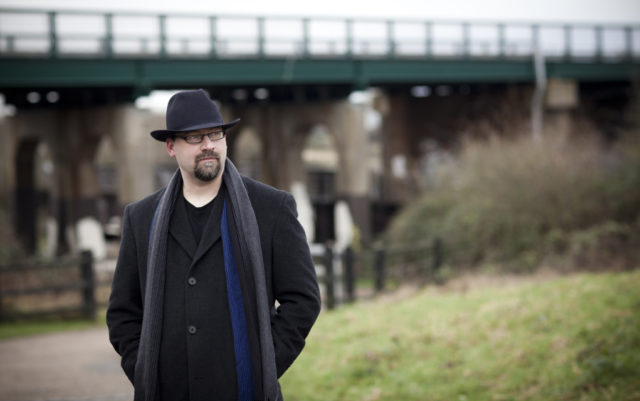
Mahler, it is well known, loved to hike in the Alps. So it is fitting that Kenneth Woods, the brand new artistic director of the Colorado MahlerFest, compares Mahler’s Seventh Symphony to the summit of a fourteener.
Woods succeeds Robert Olson, who retired last year after 28 years as founding director of the festival. The Seventh will be the major work performed at this year’s MahlerFest XXIX, with performances by Woods and the MahlerFest Orchestra. Also on the orchestral program will be the U.S. premiere of Nachtmusiken by Austrian composer Kurt Schwertsik, which was commissioned for a Mahler festival in Manchester, and a symposium by leading Mahler scholars.
Throughout its 28-year history, MahlerFest has presented discrete cycles of Mahler’s major works, starting with the First Symphony and, in each cycle, progressing more or less in order to the Ninth and the unfinished Tenth Symphony. When Olson ended his tenure last year with the Ninth, the third cycle was left incomplete. Woods decided to jump back to the Seventh Symphony to fill a gap in that third cycle.
He also wanted to do the Seventh because, he says, “I’ve loved it since I was a little kid. It’s a largely happy work. It’s funnier than most of his music, and it’s very big-hearted music. People will love it.”
Composed in 1904 and ’05, the Seventh is one of the least familiar of Mahler’s symphonies. It comprises five fairly diverse movements, two of which — the second and fourth — are titled Nachtmusik (Night music). The diversity of the movements is sometimes seen as a weakness, but Woods sees the diversity as strength.
“I think so much of what happens in the piece is motivated by his love of music, and what you can do with different kinds of music” he says. “[There is] musical humor, musical drama, marches and devil’s dances and love songs.
“It seems like he wanted to take one symphony and just say, ‘Isn’t life rich and interesting, and isn’t music fantastic?’”
And then Woods ties the symphony to Colorado’s 14ers: “The Seventh Symphony comes from this moment when Mahler’s at the top of his game,” he says. “Anyone who has climbed a 14er knows that when you get to the top you want to savor it. You want to stop and look at the view, but you can’t stay up there all that long. Mahler’s Seventh is that moment when he’s reached the summit.”
Woods believes the Seventh also represents a change of focus for Mahler. His earlier symphonies had featured narratives about a hero who struggles against the world. In the Sixth Symphony, the hero is felled by three cruel blows of fate.
“The Seventh Symphony seems to be pulling back the camera a little bit,” Woods says. “You start to realize how much bigger the world is, and your experiences and the experience of nature, than just what happens to a single man. It’s a much bigger canvas.”
The Nachtmusik movements color parts of the Seventh Symphony, but not all. “You start in a nocturnal landscape, and you end in daylight,” Woods says. “In the last movement we open the door and walk out into downtown Manhattan on a Monday morning — noise and people everywhere, and isn’t this great? Life goes on!”
It is the Nachtmusik movements that suggested the connection to Schwertsik. Not well known in this country, he has written for orchestras across Europe. Originally trained as a modernist, he changed later in life to embrace tonality and more beauty in music.
“I was lucky enough to hear the premiere in Manchester,” Woods says. “Nachtmusiken is very attractive, very musically sophisticated, serious minded but also humorous and beautiful and accessible.”
Besides, he adds cheerfully, “it’s got an accordion solo, and it’s a bucket list thing to me, to conduct a work with a big accordion solo.”
Schwertsik is likely to be the first of many composers whose music will be brought into MahlerFest. “I wanted to broaden the repertoire and find pieces that contextualize Mahler,” Woods says. “There’s other ones I am anxious to do, and I’d love to commission a few new works.”
Whether Mahler, Schwertsik or others, Woods is aiming the festival at the audience. “We want the general public to know that this is a festival for them,” he says. “If they come, they’re going to love it.”
In other words, he hopes you will take the time to savor the summit at this year’s MahlerFest, even if you can’t stay all that long.
On the Bill: Colorado MahlerFest XXIX, featuring Gustav Mahler’s Symphony No. 7 and the U.S. premier of Nachtmusiken op. 104 by composer Kurt Schwertsik. 7:30 p.m. Saturday, May 21 and 3:30 p.m. Sunday, May 22, Macky Auditorium, 1595 Pleasant St., Boulder. (Pre-concert lecture one hour before each concert). For a full schedule: 303-872-0466, mahlerfest.org/mahlerfest-xxix/














